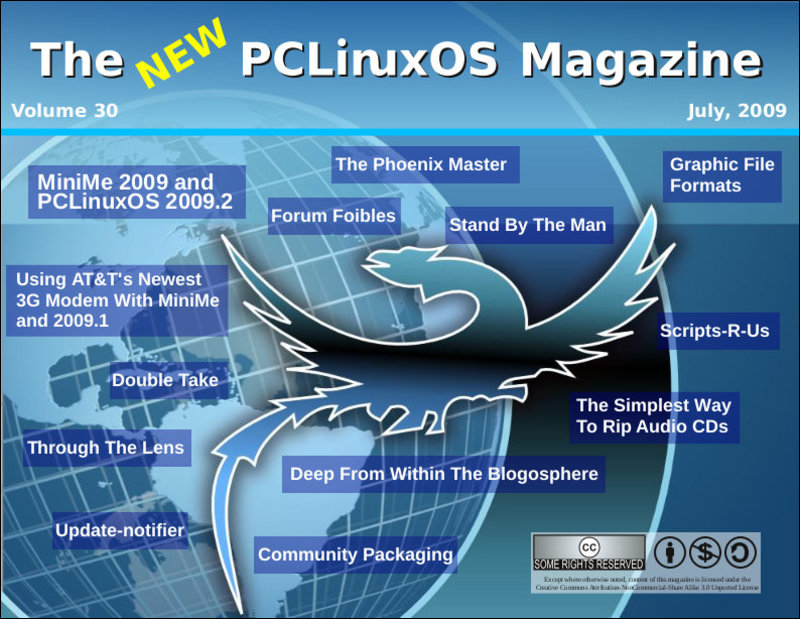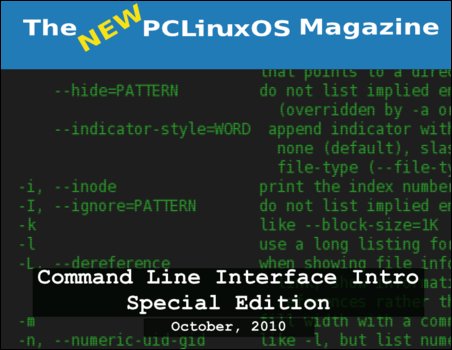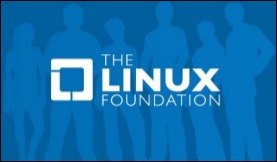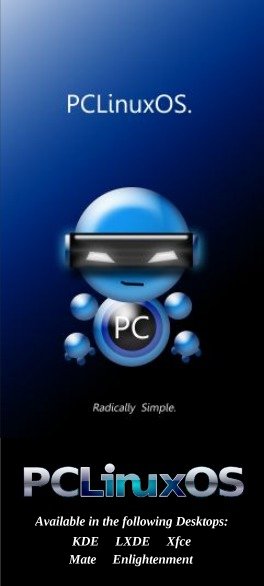| Previous
Page |
PCLinuxOS
Magazine |
PCLinuxOS |
Article List |
Disclaimer |
Next Page |
Seven Years Later: A Look Back |
|
by Paul Arnote (parnote) Holy cow! Or I guess I should I say "Holy Dobie!" I can't believe that seven (7) years have gone by with me sitting in the Chief Editor's chair. I'm not complaining, but it was never supposed to be like this. After this much time, let me try to recall the events that led up to the past seven years. After all, every story has a beginning. In May, 2009, a "special edition" of the magazine was released after complaints that a new copy of the magazine hadn't been seen in four months. Historyb was the editor at that time, and he had transitioned the monthly magazine into a quarterly magazine. He claimed that there just wasn't enough "stuff" to write about to maintain a monthly publication schedule. So, they gathered up all the articles they had held back or collected, coupled with some new ones about a new kernel release, and threw them all into a "special edition" of the magazine. Around the same time, there was a mutiny of sorts going on among some of the powers that were maintaining PCLinuxOS. Texstar had taken a sabbatical for health reasons, and placed control and maintenance of PCLinuxOS into the hands of those he thought he could trust. The 2009 version of PCLinuxOS had just recently been released, and some of those who had worked on the 2009 release had tried to position themselves into positions of "power." Some felt that they were trying to take PCLinuxOS over in Texstar's absence. Feelings got hurt, things were said, so a group of them -- quite a few of them developers and packagers with PCLinuxOS at the time -- banded together to set off to create their own Linux distro (Unity Linux, which really never saw any true or sustainable success), leaving PCLinuxOS with an exceptionally small group of developers and packagers. However, a loyal core remained. When the "special edition" was released, it was chock full of ads for TinyMe, which was a version of PCLinuxOS that focused on being very lean. It came in at around 300 MB for the entire ISO. It had also lost its "official" status as a PCLinuxOS version, for reasons that really don't matter at this point. Texstar had asked historyb to replace the ads before releasing the magazine, but historyb refused to comply. Instead, he attempted to claim ownership of the magazine and shut it down, instead of simply replacing the ads. As is often the case when a void is created, others stepped up to fill the development and packaging shoes. In the case of the magazine, Archie Arevalo (you know him as one of the forum's global moderators, Archie), undertook the task of revitalizing the magazine. Having a background in journalism (I was a newspaper photographer for over 10 years before changing professions to work in healthcare), I joined in on the planning. Together, we worked to put out the "NEW" PCLinuxOS Magazine, with July 1, 2009 as our target. Along the way, we collaborated on designing a new masthead for the magazine (which has since been changed), a new layout for the magazine (which has undergone a couple of further modifications), and laying out the guidelines for the magazine's future.  In that issue, Archie announced that I would be assuming the role of Chief Editor of the magazine. He had discussed it with me a day or two before the release of the July 2009 issue. I distinctly remember discussing how long I would possibly continue as the magazine's editor, and planning on doing it for a year or two, until someone else could be identified to take over the position. Uhm ... that was seven years ago, and I am still here, putting out a monthly magazine. The Journey Over the years, I've overseen many changes in the magazine. Initially, Andrew Strick was named as the magazine's assistant editor. And, Andrew laid out the August 2009 issue of the magazine -- mostly, because I had ZERO experience with Scribus (used to produce the PDF version of the monthly magazine) and Andrew already had a pretty good grasp of Scribus. However, Andrew was in law school (he has since graduated and is working somewhere out in the wild legal world as an attorney), and as a result, he wasn't as available as he had originally thought he would or could be. His participation was, understandably, intermittent. When the September 2009 issue came due to assemble, I was pretty much on my own, trying to figure out and learn Scribus in the hardest way possible ... learn it by doing it. Andrew was too busy with school to be able to help much, with the new semester just getting started. To top it off, I did a lot of it in the hospital at my wife's bedside, after she was hospitalized in late August of that year for about four days following a pretty nasty post surgical infection. Today, I'm extremely proficient with Scribus. If you're trying to learn Scribus, the best advice I can give you is to stick with it ... and make good use of layers. You will likely want to throw in the towel out of frustration, but stick with it. It becomes easier and easier the longer you use it. Plus, you'll get much faster the more you use it. Meemaw is the only holdover from the "old" days of the magazine, having worked on the magazine under former editors Tim Robinson, PapaWoob and historyb. She assumed a low profile during the turmoil, and resumed her assistance with the September 2009 issue. Since then, she has written many, many articles for the magazine. In August 2010, Meemaw was named a co-assistant editor, due to Andrew's schedule being consumed by law school. By that time, Meemaw was not only writing articles, but assisting with the proofreading and editing of articles, as well as helping with the monthly magazine layout chores. She has been very involved in helping create the magazine's covers since joining the revitalization of the magazine. Eventually, Andrew faded away due to the demands of school and starting a new career, and the "co" was dropped as Meemaw became THE assistant editor. Quite frankly, I don't know how I'd be able to do all of this without her assistance. Over the past seven years, I've witnessed many contributors come and go. Each, in their own way, has helped shape the magazine. At the risk of leaving someone out, I'd like to thank those who, in the past, have helped shape the magazine. If I've left anyone out, I offer my apologies. So, a sincere thank you to Macedonio Fernandez, David Lally, Mark Szorady (georgetoon), Sproggy, Hootiegibbon, Malcolm Ripley (malc), Darrel Johnston, daniel (a.k.a. leiche), Not_Yet_16, BigBearOmaha, Don Cristi, Andrew Strick (stricktoo), Archie, Joble, Andrew Huff, Patrick Horneker, galen, Timeth, AndrzejL, maik3531, pinoc, Slavisa Milojkovic, Gary L. Ratliff, Sr. (eronstuc), csolis, Bob Krausen, Rudge, Efstathios Iosifidis (diamond_gr), Jim Wilkinson (jimwilk), Grandpa, cstrike77, longtom, Antonis Komis (agmg) and loudog. There have been many contributors to the magazine over the past seven years, and I want to thank each and every one of you. Again, I apologize if you weren't named in the aforementioned list, but every contributor has placed their own indelible mark on the magazine, and helped to make it what it is today. I've also witnessed several "regular" columns come and go. In the past, we've had Mark's Gimp Tips & Double Take, Forum Foibles, ms_meme's monthly calendar, Repo Spotlight, Wiki Wicket, alternate free operating systems, and Scripts R Us, to name a few. I've overseen the birth and growth of some magazine regular features, such as Screenshot Showcase, ms_meme's Nook, PCLinuxOS Puzzled Partitions, and the monthly graphics tutorials that alternate between how to use Gimp and Inkscape. We've run many article "series" covering all of the major desktop choices in PCLinuxOS, LibreOffice, video tools, Firefox add-ons, computer and internet security, money manager/financial programs, and personal information managers ... among others.  Some of our article "series" have given birth to "special editions" of the magazine. The special editions of the magazine were conceived to act as an additional reference resource for PCLinuxOS users. Our first special edition was a gathering of all of the articles covering KDE 4. That was followed by the Command Line Interface Intro special edition, with all of critter's excellent articles on how to learn the command line. We then combined all of the Xfce and LXDE desktop articles into the Gtk Lightweight Desktops special edition. Next came the Enlightenment desktop special edition, followed by our Scribus special edition. The Openbox special edition came next, followed by the Gnome 2.32 special edition. When Windows 8 came out, we came out with our Windows Migration Guide to assist users in migrating from the failed Windows interface to PCLinuxOS. The Xfce Power User Tips, Tricks & Tweaks special edition was next. In the very near future, be on the lookout for additional special editions, including collections of the graphic tutorial series. The road ahead There's a lot I could talk about here, but I'll save it for another time. There is, after all, another milestone rapidly coming up for The PCLinuxOS Magazine. On a personal note, I am not planning on going anywhere. Even though my original intent was to hold the Chief Editor position for only a year or two, and even though I had at one time REALLY wanted to learn how to package RPMs for PCLinuxOS (managing the magazine doesn't leave a lot of extra time for such pursuits), I plan to keep on heading up the production of the magazine every month. In seven years, a lot can change. Indeed, I've seen a lot of change, both with the magazine itself, and in my personal life. The latter has had the most impact. My son was born nearly three years ago, and our second child is due in a couple of months. All that "free time" I had when I started in this position isn't quite so "free" any longer. Finding the time to work on magazine articles, managing the magazine's website, laying out articles and assembling the magazine PDF, and performing other magazine business is getting more challenging. It forces me to get more creative in looking for opportunities to make time available. Probably the most challenging aspect of this position is getting individuals to contribute to the magazine -- preferably on a regular basis. But even an occasional article every now and then helps. No one working on the magazine is paid. Our compensation is the satisfaction of giving something back to the PCLinuxOS community. As such, we are a community magazine -- of the community, by the community, for the community. We need contributions from the community in order to thrive. Neither I, nor Meemaw, can possibly think of everything that needs to be covered. Every user has a unique perspective and an equally unique approach to solving problems, and it's in the best interest of the community to capture as much of that uniqueness as possible. This has been the longest running -- and most frustrating -- part of this position. It's one thing that me and Meemaw struggle with continually. I remember asking Meemaw some time ago if she were interested in moving into the Chief Editor's chair. Her answer was quick, brief, and succinct: no way, no how. No one else has emerged as a possible successor, and no one appears to be on the horizon or radar. But then, I really wasn't "on the radar" when I got this position, either. Up until the time that I assumed the editor's role for the magazine, I had only written a couple of articles that ran in the magazine. I was an "occasional" contributor. As such, I plan to remain in this position for the foreseeable future. I'd really hate to see that which we've worked so hard to create and maintain, disappear. I only hope that we've been able to produce a magazine over the past seven years that the PCLinuxOS community is proud of. I know that Meemaw and I are proud of the work that we've done. But our personal opinions are just that -- opinions. For us, what really matters is how the community feels. Even though The PCLinuxOS Magazine is read by users outside of PCLinuxOS, it's the PCLinuxOS community's opinion that matters the most to us. Gauging by the comments in the PCLinuxOS forum, I believe that we have succeeded. Today, we have the longest, continually published community Linux magazine in existence. Our goal is to keep the PCLinuxOS community proud -- and informed. |




